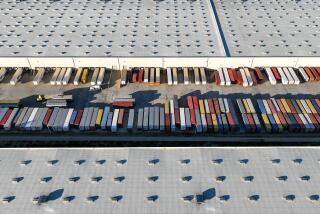Inland Empire warehouse workers walk off job, protest conditions
As many as three dozen workers at a warehouse in Mira Loma walked off the job Wednesday to protest what they called poor working conditions.
A spokeswoman for a group that is supporting the workers said they were suffering from poorly ventilated workspaces, high heat, and faulty and unsafe equipment.
The protest took place at a warehouse operated by NFI Industries, which employs about 300 workers. NFI is a New Jersey logistics, storage and distribution services company that operates warehouses in several Southern California locations for major retailers, including Wal-Mart Stores Inc.
“These workers have exhausted all options,” said Guadalupe Palma, a director of Warehouse Workers United, an organization that receives funding from the Change to Win labor federation and has been working to try to organize Inland Empire warehouse workers.
Attempts to reach NFI about the walkout and the reports about the working conditions were not successful.
The walkout was the latest in a series of escalating conflicts between workers at the nation’s largest network of warehouse and distribution centers and their employers.
In January, the California Division of Occupational Safety and Health issued $256,445 in citations for more than 60 violations found during inspections of warehouses in Chino that were operated by National Distribution Centers and its temporary staffing contractor, Tri State Staffing.
The infractions included unstable storage stacking, unguarded machinery and lack of fall protection for people working in high areas. The inspections came in response to complaints from Warehouse Workers United.
In June, a study released by the labor-backed group National Employment Law Project said that Wal-Mart had applied its aggressive cost-cutting to logistics, helping to drive down wages and benefits for U.S. warehouse workers.
At the time, Wal-Mart spokesman Dan Fogleman said the company holds “contractors and subcontractors to the highest standards and expects them to comply with all applicable laws.”
Wednesday’s walkout at the NFI warehouse came a day before Warehouse Workers United and other labor supporters were planning to begin a 50-mile protest march from the Inland Empire to downtown Los Angeles that is supposed to take place over about five days.
Elizabeth Brennan, communications director for Warehouse Workers United, said that the march would highlight their claims that workers face inadequate access to clean water, work in temperatures that top 100 degrees, and have little access to basic healthcare, regular breaks, and properly functioning equipment.
Labor experts said that the warehouse workers have no official union affiliation, adding that labor organizations have had no success in organizing them.
Those experts said that the lack of power of warehouse workers stood in sharp contrast to another kind of worker on the supply chain that starts with longshore workers at the nation’s seaports.
The dockworkers, represented by the International Longshore and Warehouse Union, load and unload ships carrying imports for sale in the U.S. and exports destined for overseas markets.
The 50,000-member ILWU is perhaps the most powerful union of its size in the nation, commanding middle-class wages and excellent benefits, but the experts said that this labor strength quickly evaporates only a few miles inland, at the distribution warehouses.
“Just a few miles inland, you have workers in the same industry who have no union clout and they are bearing the brunt of the weak economy,” said Harley Shaiken, a UC Berkeley professor who specializes in labor issues.
ALSO:
Poverty rate holds, incomes dip
Federal stimulus expected, impact doubted
U.S. financial crisis, recession price tag: $12.8 trillion
More to Read
Inside the business of entertainment
The Wide Shot brings you news, analysis and insights on everything from streaming wars to production — and what it all means for the future.
You may occasionally receive promotional content from the Los Angeles Times.











